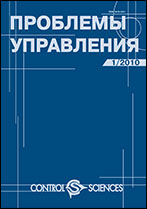|
This article is cited in 1 scientific paper (total in 1 paper)
Control in the socio-economic systems
Scenario-cognitive modeling of complex systems based on event-driven identification of factor dynamics
I. Chernov
Trapeznikov Institute of Control Sciences, Russian Academy of Sciences, Moscow, Russia
Abstract:
This paper is devoted to methodological problems of increasing the effectiveness of scenario analysis and modeling of development processes in socio-economic systems. The corresponding results can be used in management decision support systems for proactive evaluation of their effectiveness. Several limitations of the traditional approach to scenario-cognitive modeling are considered; due to these limitations, the resulting scenario neglects key events directly affecting the assessment of the current situation and decision-making. A novel approach is proposed to identify and analyze the dynamics of factor values when studying the model as well as to form additional scenario-event relationships between the factors in order to increase the adequacy of the model to the situation. A computational algorithm is developed to analyze the dynamics of factor values of the model. This algorithm is implemented and tested within the program-analytical complex of scenario modeling. Finally, an example of using the algorithm is given.
Keywords:
control, scenario approach, graph models, simulation modeling, event identification, factors, verification.
Received: 04.04.2023
Revised: 16.05.2023
Accepted: 18.05.2023
Citation:
I. Chernov, “Scenario-cognitive modeling of complex systems based on event-driven identification of factor dynamics”, Probl. Upr., 2023, no. 3, 65–76; Control Sciences, 2023, no. 3, 55–64
Linking options:
https://www.mathnet.ru/eng/pu1316 https://www.mathnet.ru/eng/pu/v3/p65
|

| Statistics & downloads: |
| Abstract page: | 63 | | Full-text PDF : | 33 | | References: | 21 |
|




 Contact us:
Contact us: Terms of Use
Terms of Use
 Registration to the website
Registration to the website Logotypes
Logotypes








 Citation in format
Citation in format 
